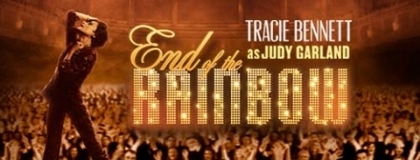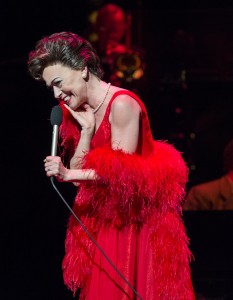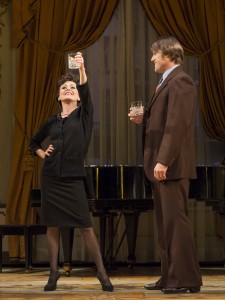A TRIUMPHANT TRAINWRECK
If you’ve never applauded a trainwreck, be prepared to do so when you see Peter Quilter’s End of the Rainbow. I am not talking about the gossip-driven, hardly revelatory play about Judy Garland’s last days; I am talking about Tracie Bennett’s devastating portrait of a Ritalin-addled, vodka-soaked, emotionally greedy and equally needy, grimly caustic, self-destructive, narcissistic, sometimes downright funny woman who has probably exhausted everybody in her life and now finds herself in a swank room at London’s Ritz Hotel — which she, of course, remembers 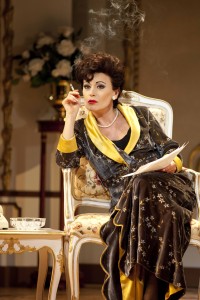 as being much larger than it seems now, just as she still imagines that she is as talented as she was in her prime. Her decline is at its steepest, and Bennett captures every single frightening aspect of that perilous and ultimately fatal deterioration with a savage intensity that tells us everything we might want to know about human decay. What she does is to give full voice to what the play merely suggests.
as being much larger than it seems now, just as she still imagines that she is as talented as she was in her prime. Her decline is at its steepest, and Bennett captures every single frightening aspect of that perilous and ultimately fatal deterioration with a savage intensity that tells us everything we might want to know about human decay. What she does is to give full voice to what the play merely suggests.
She is holed up in the suite, whose bills she cannot afford to pay, with her handsome young fiancée Mickey Deans, who clearly satisfies her raging sexual needs and who clearly means to exploit the great Garland for his own never fully-stated purposes. Also on hand is her gay accompanist, Anthony, who would offer the kind of solace and nourishment any gay man would have given her if he had a chance (which is perhaps a subtler exploitation, but an exploitation nevertheless). She’s got a gig at the Talk of the Town, which she seems to approach with as much fear and panic as if it were a jail sentence, and which she seems able to get through only if she has the pills and booze being denied her by, seemingly, the only two friends she has.
Bennett delivers one of those once-in-a-lifetime performances that theatergoers miss at their own risk. She finds every beat of the woman’s anguish that lies just below the surface of her ferocious but sophisticated sense of humor. She straddles both the anguish and humor with an almost shameless abandon so that, when she becomes desperate for whatever it takes to keep her going, she is even willing to get 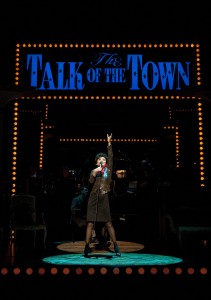 on all fours and beg like a dog. She rails against the very audience she feeds upon. In performance, she basks in their approval one minute, dismisses them with disdain as vultures the next. The little Dorothy of The Wizard of Oz has become a monster. There is nothing very new about that, but the way in which she embodies all these contradictions is stunning.
on all fours and beg like a dog. She rails against the very audience she feeds upon. In performance, she basks in their approval one minute, dismisses them with disdain as vultures the next. The little Dorothy of The Wizard of Oz has become a monster. There is nothing very new about that, but the way in which she embodies all these contradictions is stunning.
This is not an impersonation, even though she has all of Garland’s familiar gestures and vocal tremulousness down to perfection. I heard someone say, upon leaving the theater, that he had seen female impersonators who have done better jobs at capturing the Garland magic, a thought that led me to imagine some future revival of the play with just such a performer playing the part – which would precisely miss the point, since Bennett is not playing Garland at her best, but at a moment in time when that unique and marvelously pure voice was coarse and ravaged, with only traces of the greatness for which she is remembered.
The first act seems like so much marking time until her lover walks out on her and she sings “The Man Who Got Away” and, suddenly, the dots are connected, and the woman and her music become one, and what we hear is the pain and the passion, not a mere replication of the Garland version we remember – those of us who do remember it and for whom it still resonates – and there is something terrifying in its 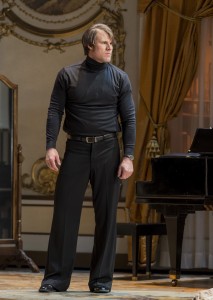 nakedness that makes us come back for the second act with guilty anticipation. It’s as if we can’t wait for her to fall apart.
nakedness that makes us come back for the second act with guilty anticipation. It’s as if we can’t wait for her to fall apart.
And we are not disappointed. The second act explodes. The relationship between Garland and Deans shatters. The Talk of the Town performances become erratic and hysterical. Garland can hardly apply her own makeup, which leads to an exquisite scene between Garland and Anthony, the gay pianist, in which he artfully recreates the Garland mask her audience wants to see. The falling apart becomes visceral and complex. Again, it has less to do with Quilter’s play than with Terry Johnson’s smooth direction, the wonderfully restrained performance of Michael Cumpsty as Anthony, and, despite the fact that he seems blander and less thuggish than images of the real Mickey Deans suggested, the persuasiveness of Erik Heger as the lover who, consciously or not, seems as bent on Garland’s destruction as she is herself. (Miles Anderson plays a BBC Interviewer and other small roles.)
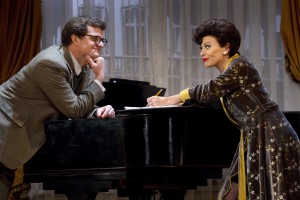 And, above all else, there is Tracie Bennett. Her manic version of “Come Rain Or Come Shine,” sung and danced while riddled with Ritalin and vodka, is alone worth the price of admission. And, finally, her “Over The Rainbow” is heartbreakingly scary. Ms. Bennett’s extraordinary interpretation is unquestionably one for the books. In a startling depiction of an authentic talent being derailed and going to waste, images of Edith Piaf or Billie Holiday or (more immediately) Whitney Houston pop up, rendering the show business tragedy as universal and far-ranging as it is specific. Still, the experience of watching End of the Rainbow leaves one exhausted, yet strangely fulfilled.
And, above all else, there is Tracie Bennett. Her manic version of “Come Rain Or Come Shine,” sung and danced while riddled with Ritalin and vodka, is alone worth the price of admission. And, finally, her “Over The Rainbow” is heartbreakingly scary. Ms. Bennett’s extraordinary interpretation is unquestionably one for the books. In a startling depiction of an authentic talent being derailed and going to waste, images of Edith Piaf or Billie Holiday or (more immediately) Whitney Houston pop up, rendering the show business tragedy as universal and far-ranging as it is specific. Still, the experience of watching End of the Rainbow leaves one exhausted, yet strangely fulfilled.
photos by Craig Schwartz and Carol Rosegg
End of the Rainbow
Center Theatre Group
at the Ahmanson Theatre
scheduled to end on April 21, 2013
for tickets, call 213.972.4400
or visit CTG
Reprinted by permission.
